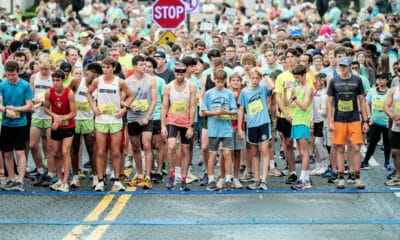City Government
Is a City Marshal System in the City’s Future and Updates on the DDA and RDA [Podcast]
Published
2 years agoon
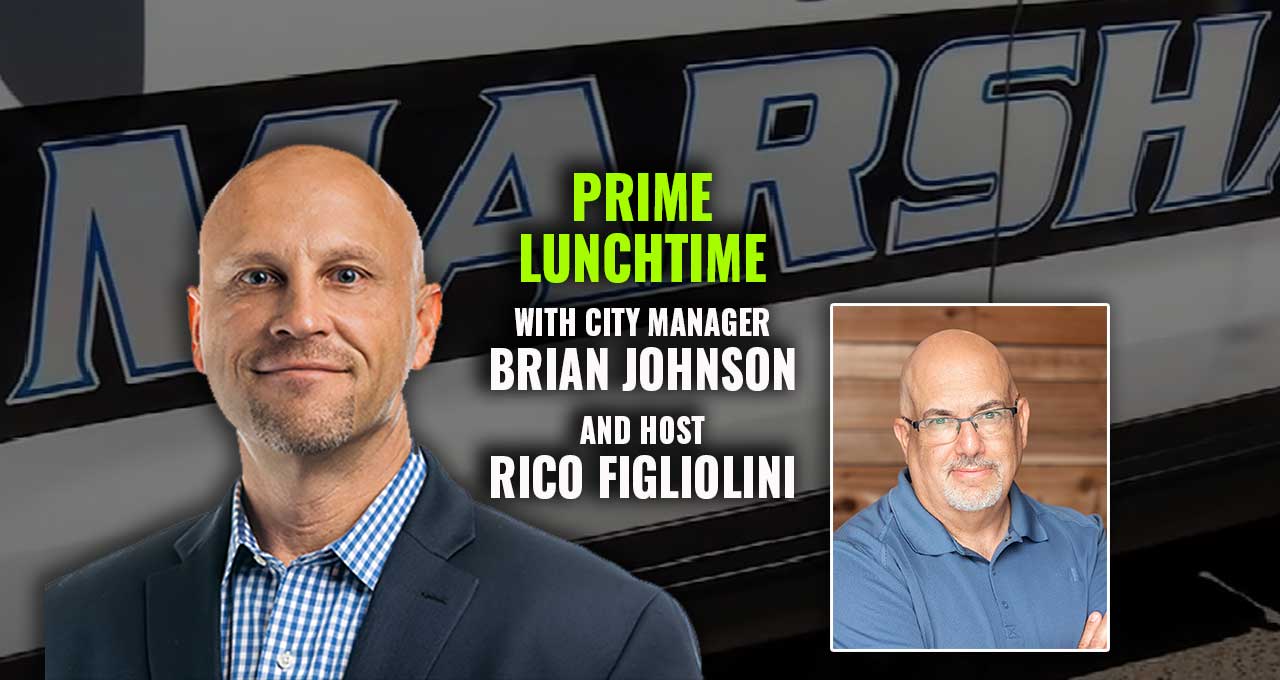
Is a City Marshal system in our future and what would it look like?
After a short hiatus, Rico Figliolini and Brian Johnson are back with a new episode of Prime Lunchtime with The City Manager. There’s a lot of new and exciting information about what’s happening in the City of Peachtree Corners. Today’s topics include; a possible future City Marshal System, The Redevelopment Authority and Downtown Development Authority plans, honorary road names, and much more.
Timestamp:
[00:00:30] – Intro
[00:02:44] – City Marshal Office System
[00:13:19] – The Authority of Future City Marshals
[00:18:58] – How the City Will Fund the City Marshals System
[00:23:37] – Honorary Roads Vs. Renaming a Road
[00:27:30] – Downtown Development Authority
[00:30:40] – Redevelopment Authority’s New Ideas
[00:36:57] – Closing
“One of our most sacred services as a city that we provide is to do everything we can to make sure this community is safe. A place to live, do commerce, recreate, and (City Council) felt like this will better provide that service.”
BRIAN JOHNSON
SCROLL DOWN TO YOUTUBE VIDEO
Podcast Transcript
[00:00:30] Rico: Hi everyone, this is Rico Figliolini, host of Peachtree Corners Life, and today Prime Lunchtime with the City Manager. Hey Brian, how are you?
[00:00:38] Brian: Rico. Good, how are you?
[00:00:40] Rico: Good, good. Much better. I finally got Covid. I’m on the other side of it, so everything’s all good. Before we get into the show, let me just introduce our sponsor, EV Remodeling Inc. They’ve been a corporate sponsor of ours for over a year now, both for the publication and these family podcasts that I do. So I want to thank them. Based in Peachtree Corners. Eli is a Peachtree Corners resident. Great guy, does great work. You can visit them at EVRemodelingInc.com and find out a little bit more about how he does design, build, and can renovate your entire home. So check him out. I want to thank him for being our corporate sponsor. We have a lot to discuss. I mean, within the scheme of things, we haven’t done this. We skipped a month. It was kind of quiet and stuff but there’s always new stuff. And certainly this podcast, we’re gonna be discussing the city’s look at activating a City Marshall system as well as discussing honorary road names and looking at the RDA and DDA, that’s the Downtown Development authority and the Redevelopment Authority and what they’re going to be doing. Let’s lead off with the City Marshall, the activation of that. I know this is in response to the concerns that citizens have had maybe not directly with the carjacking that happened at the QT and the death of a young man there. And of a young student at Norcross High School. Granted that was, he had left Norcross High School, and that was, I believe off campus that happened. But two violent crimes that occurred. Listen, the city of Atlanta all over the city, there’s, you can get notifications from 11 Alive at least five, six times a day of things happening. We’re thankful that the City of Peachtree Corners is not facing that type of crime wave or activity. But I find that this is somewhat of an innovative way of doing this. Instead of a full on police force doing something that could be a little different and still have the authority of the police. So Brian, tell us a little bit about how this came about and how you’d be looking at this and what you were tasked to do.
[00:02:44] Brian: So, you’re right, you hit on some of the origins of getting to this point. We have had some unfortunate incidents of late with deaths. There’s been some other crime and it’s not uncommon as we densify. As Metro Atlanta grows Peachtree Corners is growing. And the more people you have in an area, there’s just more opportunities for bad actors. So this unfortunate rise in these kind of things. And, you know, property crime is still our main criminal activity type here, but we are just becoming more and more of a target for bad actors. We’ve had intersection takeovers not too long ago, where you’ve got these car clubs that are seizing control of an intersection and doing all sorts of dangerous things with automobiles. You’ve had instances like that, even the failed carjacking that resulted in that death was a group of teens who specifically were targeting communities that had more affluence and better automobiles that they could do that slider crime where, you know, somebody’s pumping gas, or in this case filling air in their tires not near the driver’s side, and they slide into the seat. Because oftentimes the cars are left running, or at a minimum the keys are left in the ignition. So as a community, these instances and incidents rightly get the community, you know, like, hey, what’s going on? It seems like there’s more of it in a compressed period of time. And so we’ve started to notice this ourselves. And you’ve started to see within the last year or so more services and capital assets the city has brought into or brought to bear to help fight or prevent crime. Probably the best example of that would be of late the LPR camera system that we put throughout the city. Which our partnership with fūsus, a local Peachtree Corners Tech Park Atlanta based business that’s created a software platform that allows cameras of any type and owned by private entities. That if they give permission can be tied together to create a video surveillance net, if you will, for use by the police. But those efforts were ways for us to start saying, hey, are we doing as much as we can? And we deployed technology and we’ll continue to. That technology does work. We would prefer it to prevent crime. That’s the best crime is the one prevented. But even in the case of these two murders, our LPR cameras, the fūsus network, tying those and other privately owned cameras that voluntarily became part of the network. They ended up being the method in which the police were able to identify the gunman and find the gunman. So they work. Unfortunately, they were used after a crime was committed. We’d like to do things to prevent it, but that’s examples of what we’ve done so far. But then of recent times, council tasked me with presenting back to them in my opinion, based on all the experts I brought to bear, are we doing absolutely everything we can to make sure Peachtree Corners is a safe community to prevent or call it deflect crime away from our community? Are we doing everything and there were or is, since this hasn’t gone live yet, there is some areas in which there’s a gap. And some of those areas get into, everything from as good of a job as Gwinnett County Police Department’s West Precinct is doing. And they’re gonna remain our official police department, no doubt. But they’re handcuffed with everything from staffing shortages to even policy constraints that a countywide police department has. That if we had something that was solely focused on the city doesn’t have. And so there are sometimes gaps in the ability to direct resources based on Peachtree Corners specific needs. The enforcement of local ordinances and not countywide ordinances. And so I had to honestly, based on the assessment that my team came up with, honestly say that we weren’t doing quite everything and there was this gap that we needed to fill. And so there’s two ways to fill it. One is to stand up our own police department, which we do not want to do. And when Gwinnett PD does have the resources, they are providing a great service for us. But the other way to fill this gap, and this gap is a gap kind of between code enforcement officers, which are specifically oriented to enforcing local code and local code only and law enforcement, that’s enforcing state law. There is a gap. The gap can be filled if we stood up what we’re calling City Marshal office, very similar to what Sugar Hill has. Beauford has both Gwinnett municipalities that have an arrangement with Gwinnett PD, but they identified a gap between their code enforcement and law enforcement that they wanted to fill. So very similar to that, and that is to stand up this program. And the positions would be filled by POST certified officers. POST standing for police officers standard and training. Which is to the, you know, average viewer here is police academy. Having gone through police academy and all the training and to maintain all the certifications that you need to have certain authorities that a code enforcement officer who’s not POST certified will not be able to have. And so the intent here is to have some people who are able to fill this gap by the authority vested in their position. And be able to be controlled by the city so that they can be directed in areas that might be really important to Peachtree Corners, but it’s not, Gwinnett PD does not have the resources to specifically address. A good example of late would be, you mentioned the shooting of the Norcross High School student. That was partly driven by Norcross High School students leaving school during school hours. Truancy, if you will. And there is a truancy problem, of students cutting class and cutting through the woods into the back of businesses that border Norcross High School. Those businesses are being adversely affected. The shooting was an unfortunate result of it. But the truancy continues on students that are trespassing and then doing things like destroying property, dealing drugs, doing drugs.
[00:10:32] Rico: Right. And we were talking a little bit about that before too. About how school security are really not able to stop a kid from leaving the school short of tackling them, if you will.
[00:10:44] Brian: Well they can’t even do that. I mean, Rico, you’re right.
[00:10:47] Rico: I know I’m being facetious.
[00:10:48] Brian: Yeah, yeah. Yes.
[00:10:49] Rico: They can’t touch a kid. I understand. So some of these kids are not respectful of rules maybe, and they’ll leave the school anyway.
[00:10:55] Brian: That’s right. And when they don’t have a support network at home the school is limited to what it can do in the hours that it has the student. And so the discipline within there is certainly been newsworthy recently. But beyond that, when there are instances where they know and have evidence that the kid skipped school, they weren’t in class or whatever. You know, they’re limited in what they can do. And so it’s going to continue to be a problem. Not to say that every school doesn’t have it, but these, some of these students who potentially are bused there so they don’t have transportation or whatever. They’re just going and they’re cutting into the woods and they’re creating problems for local businesses. Now I bring that up to say there’s going to be a lot of little things brought together to help deal with this. But what we don’t currently have is, Gwinnett County PD does not currently have enough staff to run a presence patrol for certain hours of the day where it’s more problematic. And so if we had an internal City Marshal, and it’s important to us because it’s important to these businesses. I can tell City Marshall I want you to go out to the school and I want you to do a presence patrol say during the hours where there’s gaps in these kids’ schedules, they have a free period, and that’s where they tend to cut class and I want you to be driving around the back of those businesses. I want you to be a deterrent to those students. And I want you to be a resource for those. This will allow us to do those kind of things. This will allow us to detain somebody until a Gwinnett Police Officer gets there to arrest them. If they were a witness to the commission of a crime, it allows local code to be enforced at a level that a non post certified code enforcement officer cannot do. And it allows code to continue to make sure that the city is looking in the way it does that buildings are built safe, that properties maintain properly, all that stuff. They continue to do this and now we have, right now it looks like it’ll probably be three City Marshals.
[00:13:16] Rico: Is that to cover a 24 hour period, by the way?
[00:13:19] Brian: No, we’re not needing to run 24 hour at all. That’s again what Gwinnett PD is tasked with. 911 still operates the same. But another example would be the enforcement of the city’s alcohol licensing process. Those who serve alcohol have to get an alcohol license and oftentimes alcohol can be the problem of why certain businesses are not operating properly. Enforcing of that, maybe even pulling license of establishments that are not being good actors. That is a function that unfortunately without City Marshals, we have to coordinate with Gwinnett PD. Because they’re the ones that have to have the authority to enforce certain parts of that. So we depend on that. Massage parlors and licensing of those and trafficking is something that we currently have to use Gwinnett PD. Even when law enforcement gets it to a certain point, we have to stop there because we don’t have POST certified officers that would have that. This will allow us to address those. So it’s filling that gap that right now exists. We don’t have to stand up a police department. We have a good police department. They’re strained by some policy and staffing. But we can, in addition to the technology we’re using, we can have our own individuals who have the same authorities. They’re going to exercise them in a very narrow area.
[00:14:48] Rico: Right.
[00:14:49] Brian: They don’t have the same authorities as Gwinnett PD. And it’ll allow us to fill that gap. And that is what I presented to council and that is what council said, we like it. Go back and give us the exact details, the table of organization and equipment of how it’ll look. And that’s what I’m doing. But the concept of standing this up, council said one of our most sacred services as a city that we provide is to do everything we can to make sure this community is safe. Place to live, do commerce recreate, and they felt like this will better provide that service.
[00:15:27] Rico: Right. So just on a couple of little details, detail things, just clarification for some people. POST certified means they’ve gone through the police academy, the same police academy every other police officer has to go through. Same type of training. How to interact with individuals and all that stuff.
[00:15:46] Brian: Use of force.
[00:15:48] Rico: Correct.
[00:15:48] Brian: The steps of escalation. All the same stuff. Now, mind you again. By policy, we’re going to end up restricting them to a very narrow left and right limit. And that’s the gap that we currently have. So they’re not gonna be going out. The only time I see them working off hours would be if we’re having problems with certain things and they need to be out then. But code enforcement does that by, just so that you know already, is they sometimes code infractions are done after business hours. And so we have a cycle of, there’s a code enforcement officer that works a weekend day every month. They rotate through, but generally speaking, they’re still the normal eight to five type of code enforcement. This will be the same.
[00:16:37] Rico: Same on this. Three officers probably working at the same time through the week.
[00:16:42] Brian: Mostly. Yep.
[00:16:43] Rico: Individual cars for each one of them. Working closely with, or when they need to, with Gwinnett Police.
[00:16:49] Brian: Oh, absolutely.
[00:16:50] Rico: And if they end up arresting someone, they’re not really arresting someone. They’re going to detain them, most likely in the back of the Sheriff’s car
[00:16:58] Brian: Rico. A very important point is, we’re not wanting to get into starting to arrest under our authority. Even though the city has that authority and these officers would have been properly certified to do it. Gwinnett PD is going to still be our police. So these will have the authority, but they, at most would detain temporarily until a Gwinnett PD officer showed up to actually arrest. So, we’re not wanting to get into where you start having unnecessary use of force and all that stuff. No.
[00:17:33] Rico: Okay. And as far as fūsus goes, or the eye in the sky real cloud crime center.
[00:17:39] Brian: Real cloud crime center, right. And just so that you know also that program, the official Connect Peachtree Corners program. First week of January is going to be the big push where we’re going to start encouraging, because it’ll be set up and ready to receive, encouraging everybody that has video camera to at a minimum, register their camera to let Gwinnett PD know you have one. So that if there is a crime in the area of that camera, Gwinnett will know exactly who has cameras in the area, how to contact them to request the video feed of a particular time period. That will be the connect PTC through fūsus, that program will be opened up first week of January. So yes, that is a critical part of the City Marshals because now they also would end up being able to monitor video feeds. Including the city’s, we’ve got what, 82 cameras out at the Town Center now. They will be able to use that. It’s going to be a resource for them to use. And, we can charge people and run them through municipal court. So yeah, these are all assets that we want to better utilize or more utilize than what Gwinnett PD has the resources to do.
[00:18:58] Rico: And I know that some people may ask this, so this will be an important question. How will this be funded? This additional police force, if you will, or sherriff force. It’s within the same budget, right? I mean, there’s no, someone’s gonna say, does that mean that the mil l age rate will start existing or something? So tell us.
[00:19:16] Brian: Thank you for teeing that very, very important question up for me. It’s very important to know that this is all being done within the current and anticipated revenue streams that the city gets on an annual basis. Meaning we can afford it within our own budget. Which is a very important point. I mean, we’re very proud that we’re the second largest municipality in Georgia with no city property tax. And Council does not want to be the first council to levy that. So that was an important part of my proposal to them. Their first question was, alright, great. Sounds good. We see the gap. We see why you’re recommending this to fill the gap. Can we afford it? And, you know, I needed to know that before. And the great answer was yes, we can. We were generating enough fun balance year after year that the run rate for three positions, we can afford. We’ll have a one time large capital, we’re going to have to purchase three police cars, uniforms, some equipment. But once you purchase it, you’re just building in our every, however long, we’re gonna have the life cycle of a police car. Especially one that’s not doing high speed chases or whatever. It’s a pretty long one. But yeah, we’ll have that and then it’ll just be the annual run rate. But it is not going to at all, result in any, none of our services are going to result in us having to levy a city millage rate.
[00:20:46] Rico: Cool. Alright. So if anyone has questions on this, they should put comments in the comments, depending where you’re watching this or listening to it. Or reach out to us and we’ll be doing a further in-depth article on this.
[00:20:58] Brian: And Rico. It’s important to note that while council, considering public safety to be a sacred responsibility that council has. So they will not leave any stone unturned, which is why they’re supportive of this. But the exact details, the exact table of organization and equipment is being done right now. So there are a few details that I may not know yet. This is anticipated to be part of the FY 2024 budget, which starts July one of 2023. So July one of, this coming July one would be, the first time that it would end up becoming a live program because I’m building it into next year’s budget. Which is what starts July one of next year. So this isn’t something that’s going to happen in a couple weeks or even a couple months. We’re looking at six months from now.
[00:21:54] Rico: Okay. Alright. Planning. Everything needs a plan and it takes time to do these things.
[00:22:00] Brian: I mean, think about simple things like we’ve got to get in and lay out all of the policy stuff so that our insurance provider, the general liability insurance provider for the city can include this type of activity in our insurance plan. I mean, you know, people are, you don’t think about that until you get into it. And you know, are we going to have, require body cams so when they’re interacting with somebody that camera’s on. And how do we write the policy so that when they, even though they have the same authority as a police officer, we’re saying, no, this is your lane you’re going to operate in. We’ve gotta write got to policy. And so, there’s a lot of work involved. But you know, what I just told you is essentially the program. And again, we’re not the first to do this. Sugar Hill would be a great example of a decent sized city, not quite our size, but I think their last census was 25, 30,000 people. But they, Gwinnett PD is their police department provider through an intergovernmental agreement like we have. But they also have City Marshals to fill this gap. And so our program would be very similar to those, but it allows the city to be able to control assets, to fill gaps that right now we can’t really fill either very easily. Or in some cases can’t fill really at all.
[00:23:25] Rico: Alright. So more information to come on this. Like you said, there’s logistical issues that you have to deal with. And even interviewing officer candidates for the position.
[00:23:37] Brian: Exactly.
[00:23:37] Rico: Yeah, so there’s a whole bunch of stuff. It all takes time. Let’s move on a little bit towards something a little different about new policy that’s going to be put in place or being looked at to put in place about honorary roads versus renaming a road. So tell us a little bit about where that might be going and how that’s come about.
[00:23:54] Brian: So we had some requests of late of having certain people that have a prominent place in this city’s existence or the population of the area. An example of that would be, you know, Paul Duke. Very prominent name in the creation of, or the population of the area, creation of Tech Park and in the city. We’ve had some other instances where there’s an individual that played a prominent role and their family or friends or others are like, we should rename a street. And while that is done and it’s all fine, renaming streets are not always a popular thing to do and certainly can be complicated. And can cost people money. You rename a street of a business is on and they can have stationary with their address, business cards. You rename a street that a person is getting their prescriptions mailed to them, and they’re worried that it won’t get mailed to them in the right place when it changes. So to be careful, and as a result of me laying out to council when they said, hey, City Manager, what about these requests? Should we? I was like, you know, you can. It’s your right. But I laid it out. They were like, yeah, what other options are there? And there’s one, and there’s an honorary street name. And that is, you could have Main Street be the street name. Then even on the street sign underneath it, it could be the honorary Rico Figliolini Way. You know, or whatever. And so they liked that idea because it doesn’t change any of the addresses or anything, but it does recognize somebody. My community development director, Diana Wheeler, created a great policy on who would qualify. Like, I believe in the policy, you can’t be alive. You’ve got to have certain things. So the certain criteria for it, and that’s what the policy is going to be. So when somebody comes to the city and says this, we can say, no, we don’t entertain formal street renaming. But we do have an honorary street name program or policy, here’s what it is. And if the individual that you’re considering it being renamed qualifies, then well council can consider it and they vote on it, yes or no. And a different colored sign that would go, I guess above the main street name.
[00:26:14] Rico: Right. It sounds like that’s where it would be. I’ve seen them done before like that, where they’re above the main road name. Like a little smaller. So it’s less confusing, I guess. Alright. So, and that’s probably, that’s a policy that might be put in place in, I’m sure in the next City Council meeting.
[00:26:30] Brian: Well, it’ll get voted on this Tuesday, just to remind you.
[00:26:32] Rico: This Tuesday.
[00:26:33] Brian: Our December Tuesday Council meeting is moved earlier because of Christmas. So this coming Tuesday, that’s when they’re entertaining it. And based on their feedback at the work session when the policy is presented to them, I anticipate it’ll unanimously be approved. And so then we will, in fact on the same agenda, we have the very first official request for a street to be named. And it was to commemorate Perry P. Nesbit. The Nesbit family were one of the earliest settlers of Peachtree Corners. And so, that’ll actually be on the agenda after council considers the street renaming policy. So, I guess in theory, they could deny the street naming policy and then the Perry P. Nesbit request that would, obviously can’t happen. But I don’t anticipate that happening. Because, you know, council’s seen all the details so that could happen as early as Tuesday.
[00:27:30] Rico: Alright, cool. Two other things that are going on, or organizations. One’s the Redevelopment Authority, and the other one’s the Downtown Development Authority. So let’s take the DDA first, because you all are also filling some slots on those authorities currently. But part of the DDA right now exists. The mapping exists as an overlay. And the city council wants to be able to expand that it sounds like, to further go south on Peachtree Parkway towards Target and Dick’s Sporting Goods. Why expand it? And what does that mean, as far as, how that would affect the underlying area?
[00:28:10] Brian: So cities and counties, in probably all 50 states, they utilize authorities. Pseudo-governmental entities with boards of director appointed by the local governing authority, City Council, County Commission to oftentimes their goal is to facilitate economic development under certain column policy focus. So a Downtown Development Authority would be focused on facilitating economic development activity in an area defined as the downtown. And then a Redevelopment Authority would be doing the same thing, but they would have a redevelopment area of operation. And they’re really looking at areas that were developed once, but maybe it’s ran its lifecycle and their job is to facilitate activity in areas that have had initial activity. It’s not undeveloped wooded lots. These are, could be parcels or areas of a city that are seeing a decline in activity in that area. Or there’s a new better development they can consider. These authorities are created because they have certain flexibilities that the government itself does not have. And so they’re tools that cities and counties use because they’re more flexible. They can do things with developers that the city cannot do directly. A good example of that would be, Rico you could be a developer with one really innovative, awesome idea. You want to partner with the city to do something. The city is interested in doing it, and the city’s got to put money, or say it’s going to construct some aspect of it. Say we’re going to build a parking deck for your development as part of a public-private partnership. If the city does it, by law we have to bid it out. Or if we were doing a public-private partnership bid. We have to bid it out and we have to give it to the lowest qualified bidder. If you aren’t the lowest qualified bidder, we lose the right to work with you. Even if we thought your idea was the best. Authorities, like an RDA or DDA, can sole source. They don’t have to do that.
[00:30:37] Rico: They can move faster, also. There’s less red tape on that.
[00:30:40] Brian: Absolutely. And you know, sometimes the board members of these things that they have one focus. Whereas council is asked to do stuff all over the map and you know, they don’t sometimes have the time, energy, and focus to do some of this. And so they essentially delegate certain objectives to these authorities. And then these authorities run with it based on the, kind of objective constraints council gives them. And so these two boards they both exist. Of course at the end of the year we’re having to reappoint board members to other stuff too, like the planning commission, the zoning board appeals. But these two, why they’re probably unique is the DDA had three member and three slots open that council needed to fill. There were two people moved away, one passed away. And the DDA which played an integral role in the city initially, the Town Center was done through our DDA. The DDA was the one who brokered all of the public-private partnership stuff. But when it was done, we kind of shifted focus to the redevelopment authority and the south side of the city. Which is the zone, kind of the area of the city that the RDA was told, go forth and come up with a plan to enhance economic development there. And the DDA to finish up with them, the initial downtown area was drawn relatively small. Kind of around the Town Center, Forum area and that’s about it. We needed to expand probably down to the Target, Dick’s Sporting Goods, Publix area. Probably the most important part of that is by expanding it down there, it will encapsulate Tech Park. And Tech Park needs to be in the DDA’s area of concentration because they are going to be tasked with really rolling up their sleeves and seeing what we can do to continue to help Tech Park get reimagined. How can we utilize Curiosity Lab to fill vacant office space or to redevelop certain lots. They’re going to be a force multiplier and they’re going to be tasked with going and meeting with property owners and asking questions like, is the city doing everything it can to help you grow and be healthy? Meeting with developers to come up with creative ways to maybe develop their lots or fill vacant office space. And so that’s going to be their mandate. And we needed the board to be filled. And so they’re going to be filled, and that’s their mandate. And then the RDAs mandate, which is going into year two, they finished up a year in which they took their area of concentration, they did a big year long assessment of opportunities within it, and they presented those opportunities to council last month. And there were a couple of really good ideas and the lowest hanging fruit was taking inspiration from how the BeltLine has been used to revitalize areas of Atlanta. To do the same with our multi-use trail, which is our version of it. And they identified some areas along the Peachtree Corner Circle, kind of in between Holcomb Bridge Road and PIB for there to be some trailheads created for the trail system, but also for vehicles to be able to park at these trail heads. Then to become a community recreational amenity connected to our trail. And that will help spurn some of the redevelopment in the area. Maybe some enhancements or upgrades to some of the apartment complexes in the area. Maybe they’re getting better tenant. It becomes more enticing for people to live in the area because there are recreational amenities right there. Just like the BeltLine did in Atlanta. We want to do it right here. And so that’s the first, they have a number of ideas. But that one council has appropriated about 2 million for them to go ahead and acquire and construct some trail heads. Do the final design and construct these trail heads and start moving the trail off of these trail heads to ultimately connect to what’ll be, I think with all said and done, what we have identified, if it all goes well, it’ll be about a 20-ish mile trail system throughout all of the city.
[00:35:25] Rico: Wow. That’s very big. Is the 2 million from SPLOST or general funds, or how is that?
[00:35:30] Brian: It’s a mix of a number of them. There’s certainly some SPLOST, there’s certainly some storm water money because you’ve got some of the improvements are it’s gonna be done along Crooked Creek, that area. So some of the construction is storm water. So it’s a mix of revenue streams so that they have real money to do a real project. And it’s exciting. They took a year and they really came back to council with some really good ideas. Some are big and would be a very large, potentially larger mountain than the city’s prepared to do right this second. Which we didn’t want them to, you know, sky was the limit. Some of them are intermediate that they’re within reach, but there’s a few more things that we need to do. And this one was pretty simple. I mean, it’s a go out and acquire property. These are properties that are generally not developable because they’re in the floodplain stream buffer areas. Acquire it, design these trail heads, construct the trail heads, and let’s start. Let’s create this community amenity and let’s start capitalizing on it and use it to lift the entire area up and make it better.
[00:36:39] Rico: Cool. Sounds great. The RDAs, are those other suggestions, are the plans, were they presented at City Council?
[00:36:46] Brian: Yes sir.
[00:36:46] Rico: At some point? So they’re available somewhere for other people if they want to see what other ideas the RDA has in mind for the coming few years. Okay, cool.
[00:36:55] Brian: They’re on our website.
[00:36:57] Rico: Excellent. Great. So we’ve covered quite a bit. The biggest thing to me is the City Marshal system. And as you’ve explained that before, I mean, this wouldn’t start until likely July 1st, which is the budget year for the city. And out of the existing funds, no extra funds are necessary. So it’s working out of the surplus of money the city has already on an ongoing basis. And city leadership has done a great job in keeping that surplus, to me it seems. And be able to have a good, strong budget to be able to do some of these things without having to raise any taxes or anything. So all good stuff, good leadership. Brian, it’s a pleasure to always talk to you about these things and finding out more about what the city’s doing.
[00:37:38] Brian: Thanks for the opportunity to keep our stakeholders as educated as we possibly can. And hey, have a great holiday. I hope everybody has a great, safe, enjoyable holiday, and we’ll be ready to hit the ground running beginning of next year.
[00:37:53] Rico: Yeah. Let’s not forget the end of the year is coming. And by the way, anyone that’s checking their mailbox, hopefully you’ll see a new copy of Peachtree Corners Magazine. Faces of Peachtree Corners. It’s about 20 people that help make this city a better place to live in. So check it out. Good talking to you Brian. Everyone enjoy the holidays. Be safe out there because God knows, even if you’re looking around, sometimes things can happen. So stay safe. Hug your family, you know, make sure you’re around, because you never know what might happen. Thanks guys.
Related
City Government
Southwest Gwinnett Mayors Share Visions for the Future
Published
4 days agoon
July 22, 2024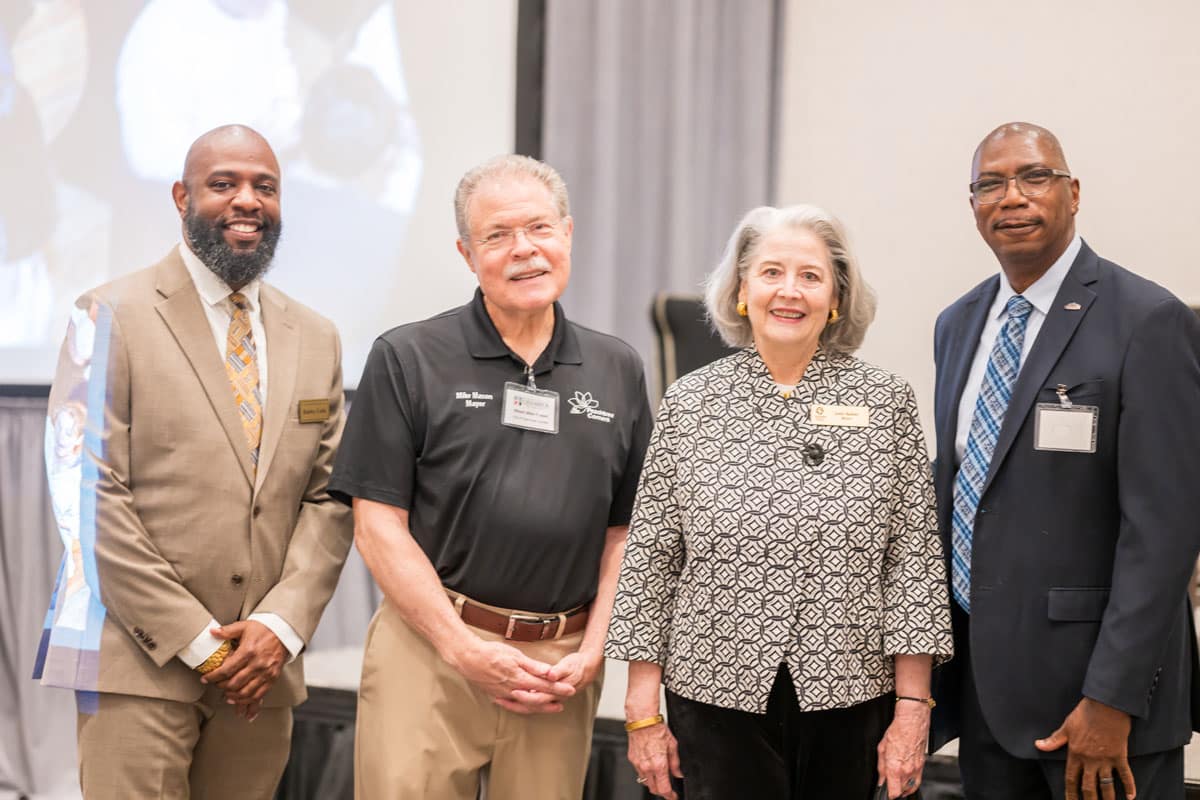
In what has now become tradition, the Southwest Gwinnett Chamber of Commerce hosted mayors from Berkeley Lake, Norcross and Peachtree Corners at a panel discussion on July 12 at the Hilton Atlanta Northeast.
The conversation centered around strategies for revitalizing and expanding metro Atlanta cities, with a focus on redevelopment, zoning ordinance reform, pedestrian and bicycle safety and investing in local schools and affordable housing initiatives.
Zoning changes
“We are beginning a really big project in our city. We have had ordinances that we’ve been working on ever since the city was incorporated in the 1950s,” said Berkeley Lake Mayor Lois Salter.
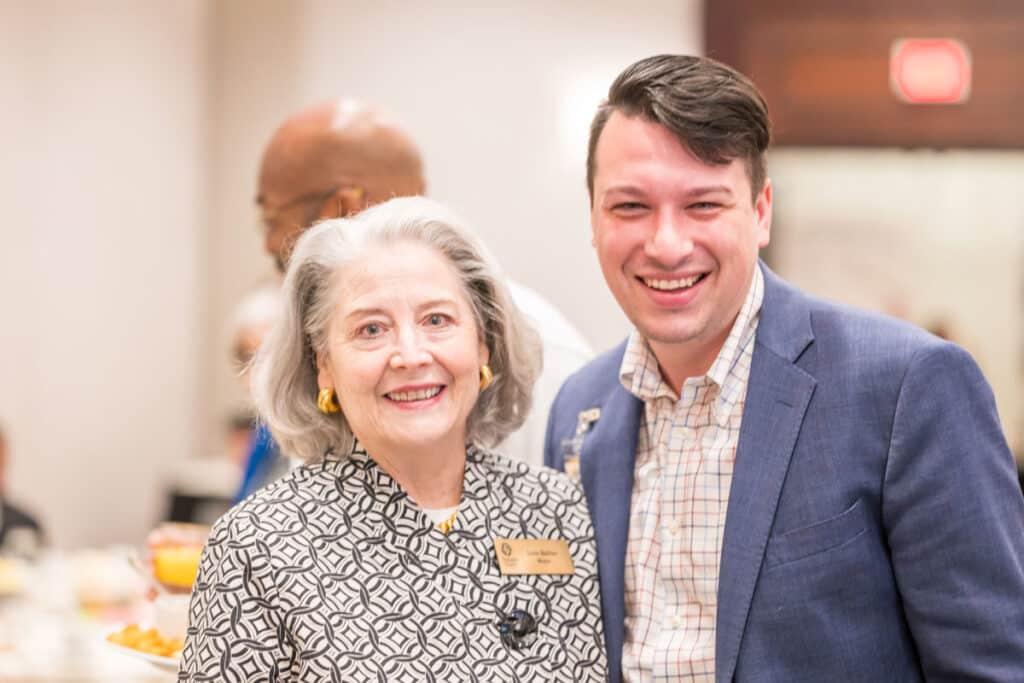
“We feel that we need to overhaul the whole zoning ordinance system and hire a consultant to come and elicit understanding and opinions from our citizens. We want them to be a part of that. We have some folks that resist any kind of regulation. They just want us to regulate their neighbors,” she added.
Norcross Mayor Craig Newton agreed that evolving needs are an important reason to change the zoning, and planning for what lies ahead is paramount. He pointed out that all Georgia cities must implement a comprehensive plan to maintain their qualified local government certifications and remain eligible for selected state funding.
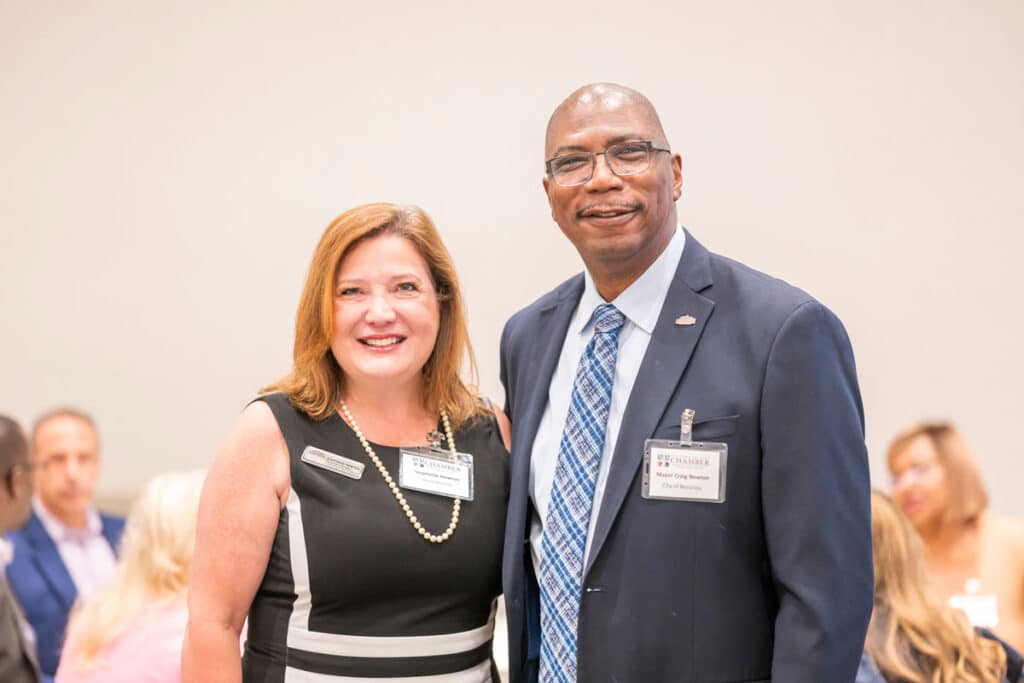
Land development
“We intend to focus on improving pedestrian bicycle safety downtown and establish a sidewalk activity improvement,” he said. “We’re also looking at approving parking in our town center and constructing the Norcross Greenway, which will bring a much-welcomed park, green space and a trail,” he added.
The county announced earlier this year that the project involves redeveloping the existing property into a park that will span almost two acres. It will offer various community spaces, including a multi-use trail, playground, covered picnic area, restroom building and a 41-space parking lot.
In addition to its amenities, a 12-foot-wide concrete trail segment will wind through the park and utility corridor, connecting Singleton Road to Dickens Road.
The trail is part of the 2018 Gwinnett Trails Countywide Trails Master Plan‘s Norcross to Lilburn Trail with an internal loop trail connecting to the neighborhood.
Commercial use
Peachtree Corners has had several “community-friendly” projects come online in the past year, but the effects of the pandemic continue to linger.
“When you think about the future, you’re thinking about the landmass and buildings and commerce. Probably the most significant issue facing a lot of us in the near term is modern office space,” said Peachtree Corners Mayor Mike Mason. “There’s a lot of space. The question is, are people going to come back?”
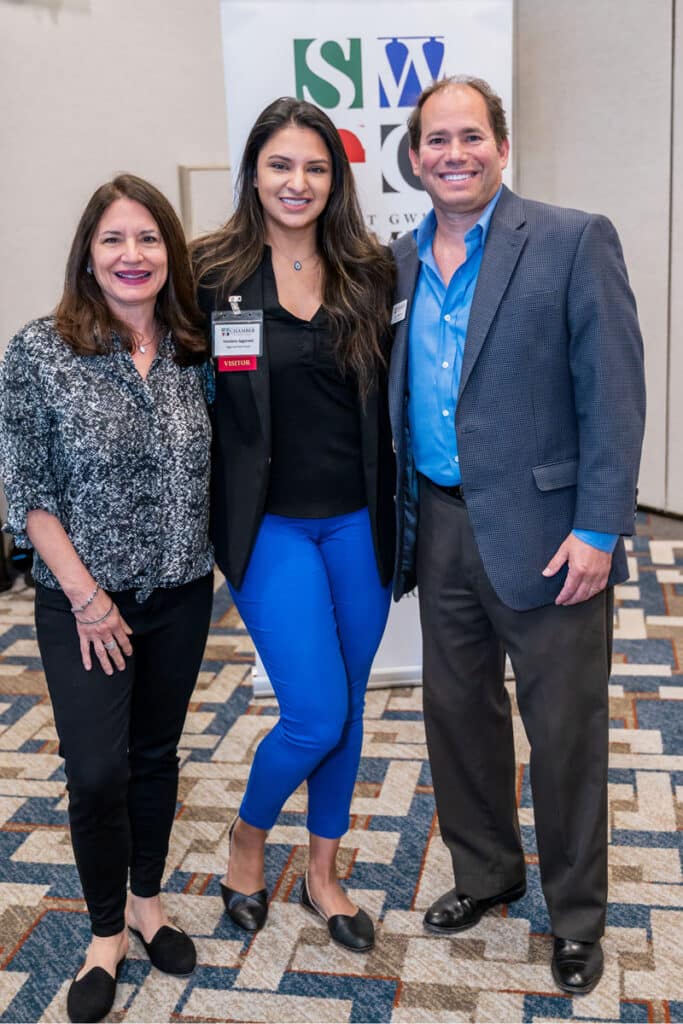
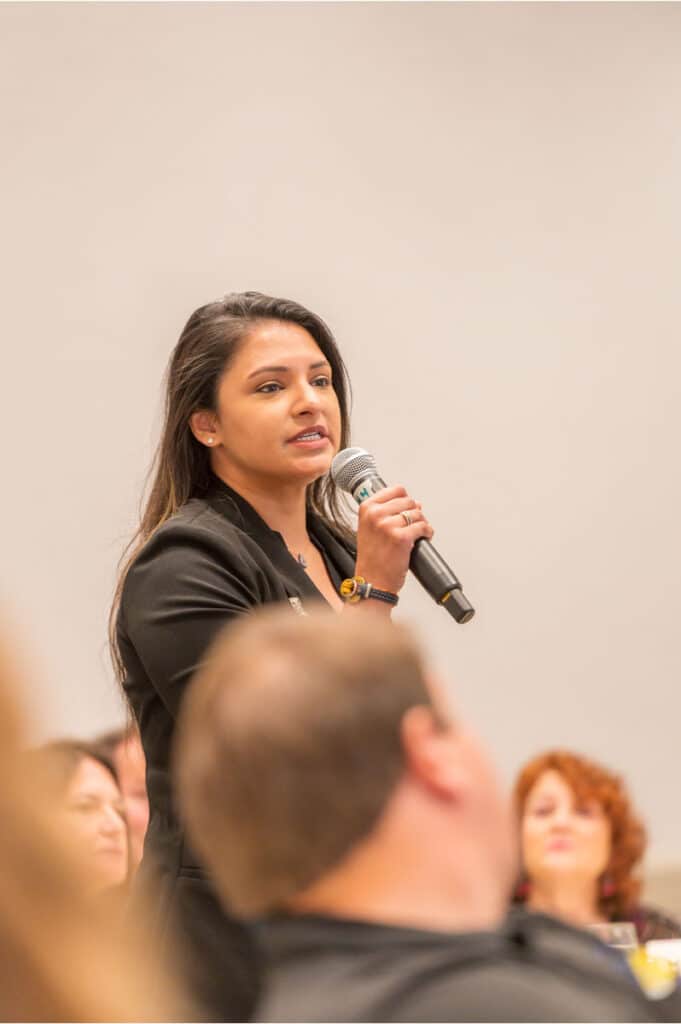
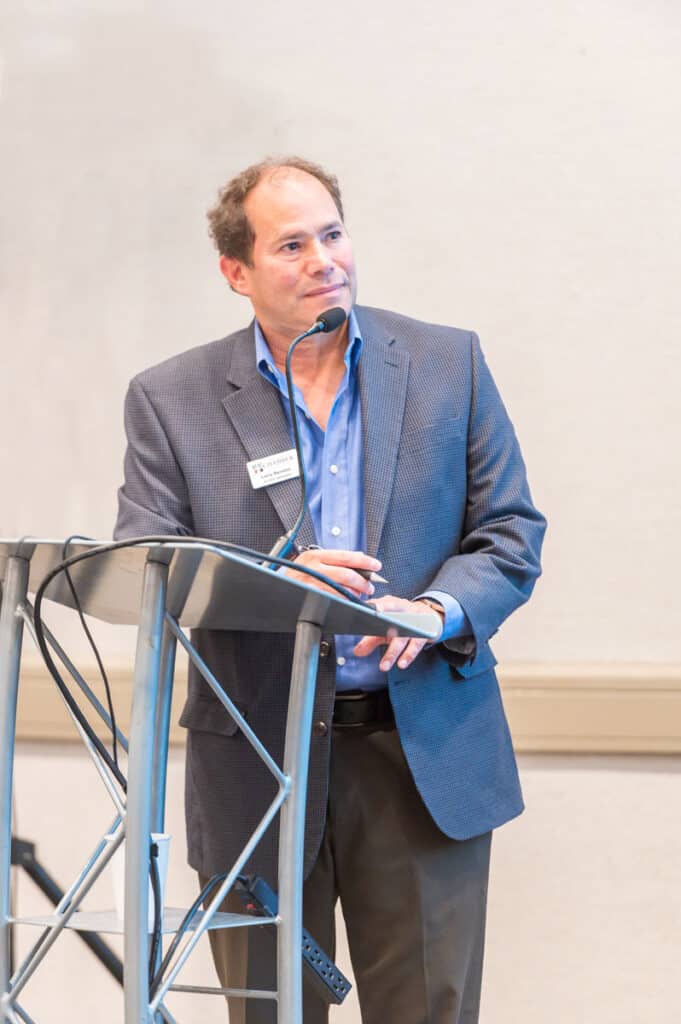
He said that the central retail area has shifted with the revitalization of The Forum and that’s making city leaders rethink city planning.
“We’re having a look at our code and things like that. But from another point of view that will drive the decision about what communities are going to look like,” he said. “For example, there are people coming into the city that say some buildings are technologically obsolete.”
Public safety
Even though Berkeley Lake is the smallest of the three cities and has the highest average home values, all the mayors agreed that public safety is a growing concern.
“Living in Norcross offers residents a dense suburban feel that’s somewhat rural compared to the city of Atlanta,” said Newton. “But some of our public safety initiatives are increasing police presence in high crime areas.”
As the only one of the three cities with a full police department, Norcross is seeking creative ways to implement effective community policing strategies to build trust and communication between law enforcement and the residents.
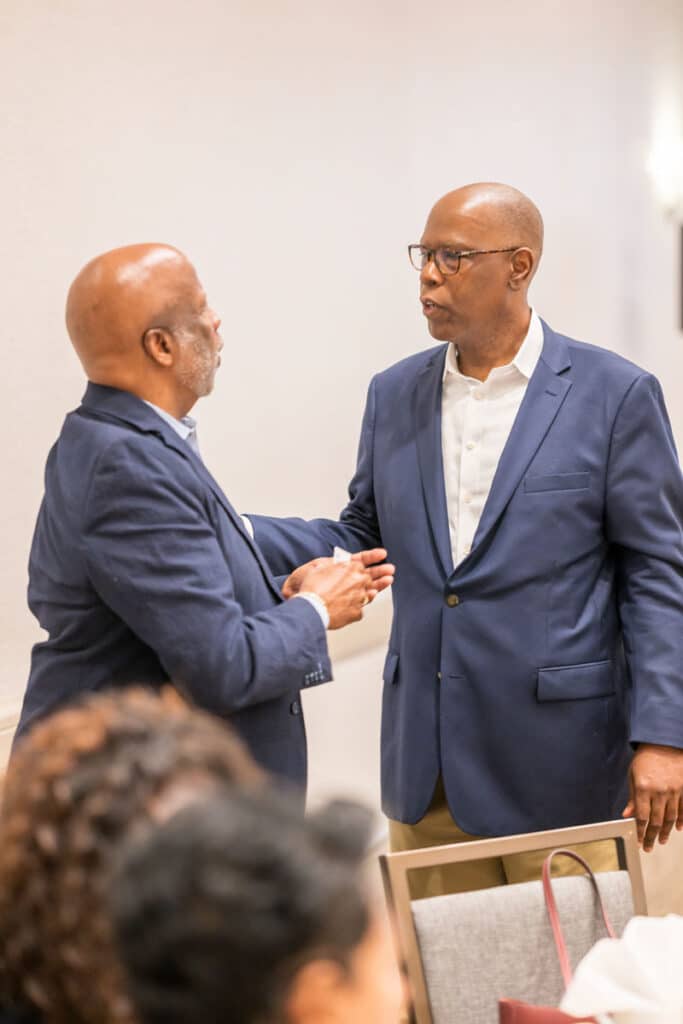
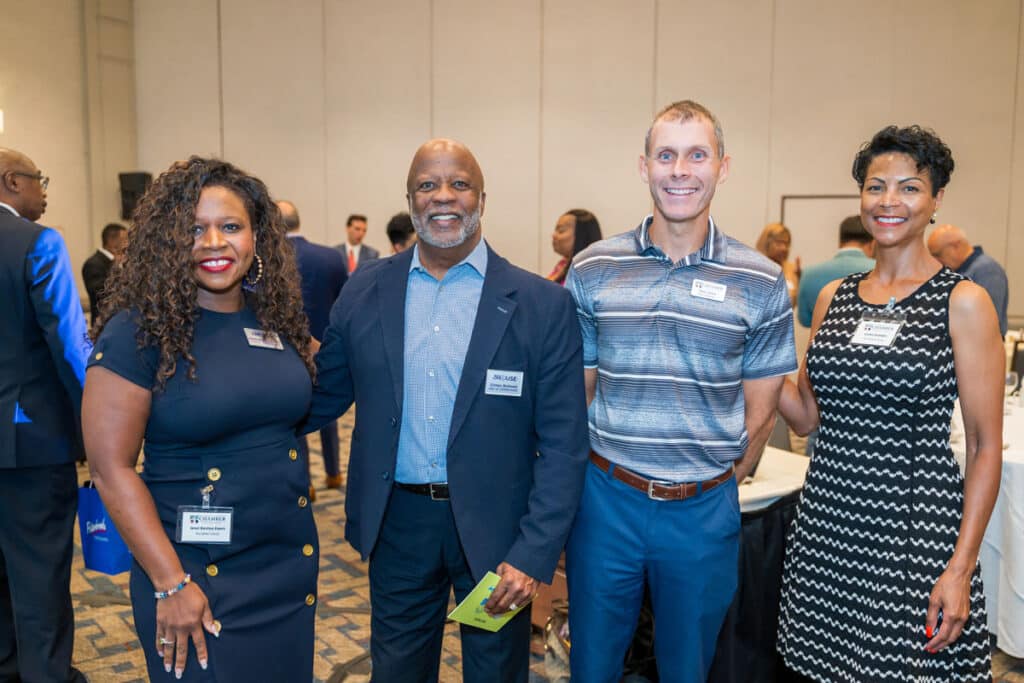
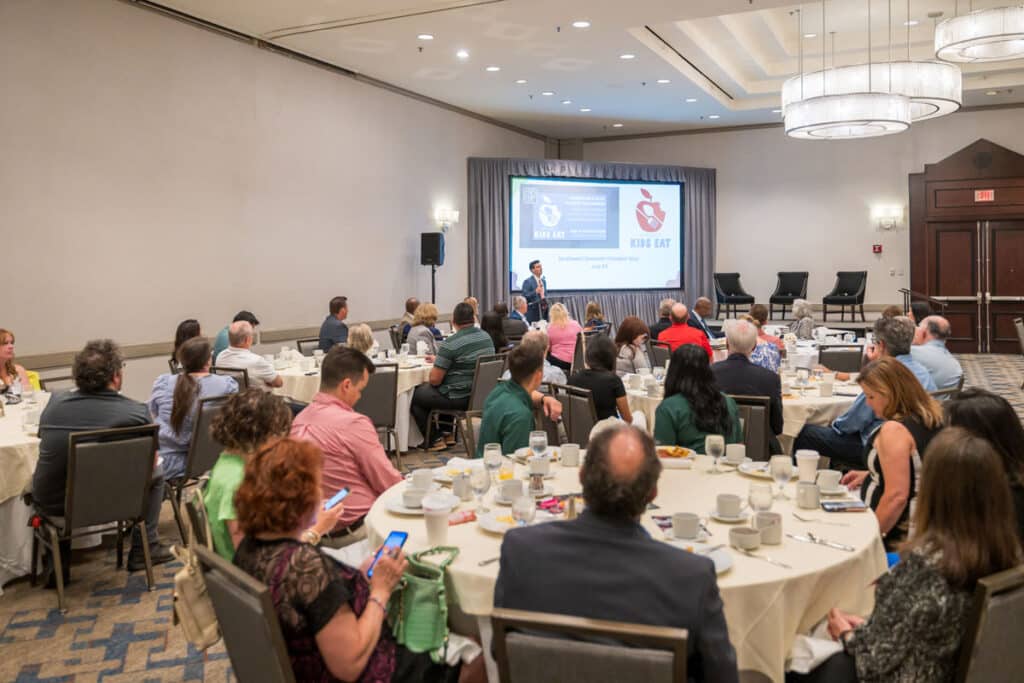
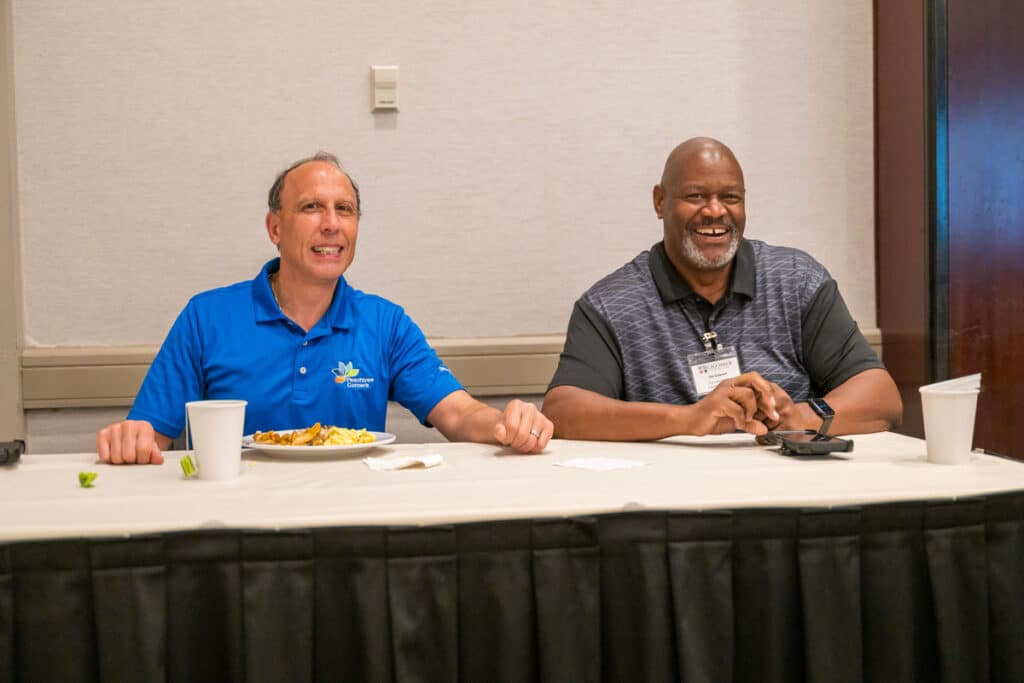
Newton mentioned programs such as Neighborhood Watch, youth outreach programs and educational initiatives along with enhancing emergency response capabilities with training for the local fire department and EMS services.
“Our response time goal is for an officer to be on-site in an emergency within 30 minutes,” he said. “But that doesn’t happen.”
Extended-stay hotels tend to attract crime, so Newton said the city has worked with owners to improve lighting in the public spaces to deter criminal activity.
“We’ve partnered with nonprofit businesses and local stakeholders to support social services employment opportunities for at-risk individuals,” he said. “By working together with various organizations and entities were able to address the complex challenge of public safety.”
Community accountability
With no police force, Berkeley Lake relies heavily on cameras and old-fashioned “knowing your neighbors,” said Salter.
“Some of our individual HOAs are buying and furnishing and paying for cameras to safeguard their neighborhoods,” she said.
Although there may be pockets of criminal behavior around the city, Salter said a police officer once described Berkeley Lake as a “black hole” of crime because there’s so little crime data.
“One of the reasons for that we feel is that historically we’ve been a very neighborly people,” she said. “There is an amazing system of community cohesiveness.”
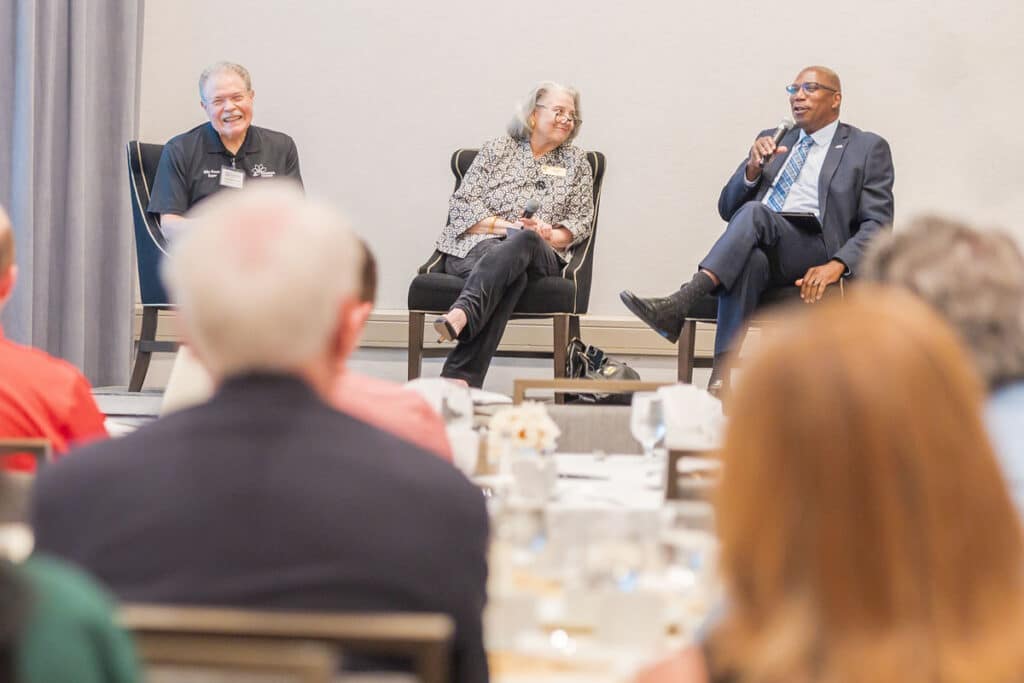
Peachtree Corners is taking its own approach.
“We’ve recently added a Marshal Service and as Lois mentioned we’re also leaning on technology,” said Mason.
The marshal department doesn’t take the place of the services provided by Gwinnett County Police, it primarily enforces city code and aids Gwinnett PD when necessary.
“We’re utilizing as much technology as we can,” said Mason.
Gwinnett PD is instructing where to locate cameras and the city keeps adding them. There have been several instances in the last year or so where coordination among agencies and the use of technology have thwarted or caught criminals.
At the end of the day, the three mayors said the cities all rely on each other. Being so close means that economic development, enhanced entertainment and other desirable amenities are boons for them all.
Related
City Government
Planning and Development is Changing in Peachtree Corners
Published
2 months agoon
June 6, 2024
From Peachtree Corners Mayor Mike Mason’s monthly column.
After the COVID-19 pandemic, the city noticed a development trend that focused on the importance of social interaction. It began seeing development applications for indoor pickleball, virtual racing, garden clubs, car clubs and other recreational uses.
When our city was established in 2012, it adopted Gwinnett County’s codes and ordinances to maintain consistency and these new social interaction-focused uses were not initially considered in the city’s current Comp Plan or zoning code.
Working from home is another market trend having a big impact on local office parks. This economic engine is driven by office parks such as Technology Park and there’s always been a priority placed on preserving office stock.
Even though the commercial office market is waning right now, that pendulum is still trying to figure out where it will settle in. Most of these new socially focused uses find the best home in an office setting.
Due to the increasing number of these applications and the evolving market trends, the city has imposed a six-month moratorium on projects in the Central Business District character area. The moratorium came into effect on May 3 and will end on November 3.
This halt will allow the city six months to pause rezoning applications, special use permits and variances applications for residential or mixed-use development. It will help the city maintain the status quo, stop new applications from coming in and allow for officials to consult with experts and delve deeper into the code and comprehensive plans.
The city plans to conduct extensive research, analysis and strategic planning during this period to help determine if any changes should be made to the comprehensive plan and zoning regulations.
For instance, it might be beneficial to designate downtown as a distinct character area separate from the central business district. Implementing new zoning regulations to transform it into an entertainment district or a unique downtown character area could be a viable option. Many cities have already adopted this type of zoning.
Office parks and businesses throughout the city provide a balance of jobs and residents that allow the city to be the second largest in the state with a zero-millage rate or no city property tax.
Therefore, as part of this process the city will research ways it can preserve, stabilize and enhance the economic engine through the activation of underutilized spaces within office parks.
This proactive approach will help maintain the job-to-resident balance that allows the zero-millage rate while positioning the city for success as the office market pendulum settles.
The most important thing this moratorium does is allow the city to consider what will work best for Peachtree Corners. Furthermore, it communicates to developers that the city requires a pause because current zoning regulations and comprehensive plan do not adequately address future goals.
Related
City Government
Peachtree Corners Welcomes New Community Development Director
Published
2 months agoon
June 2, 2024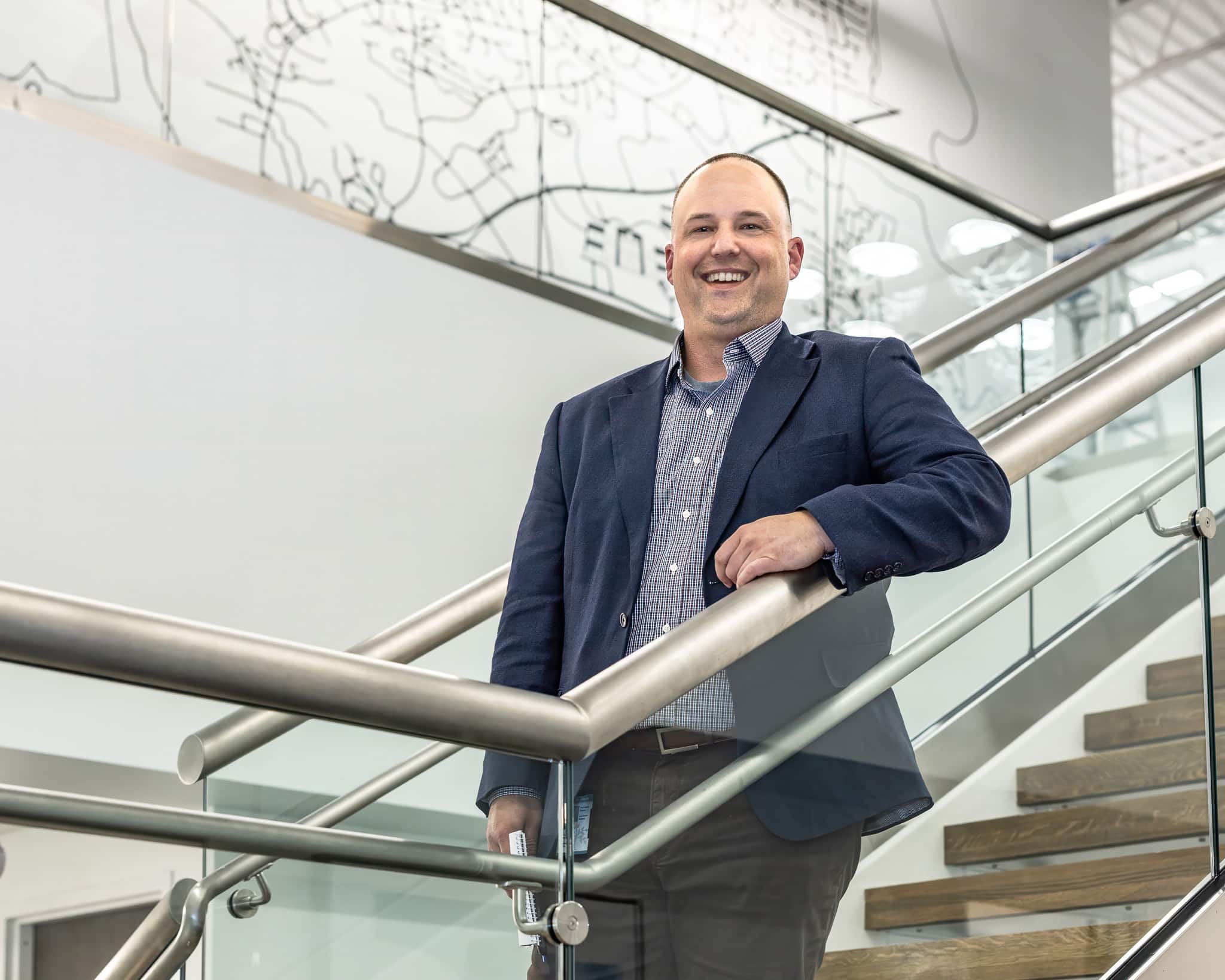
With community development director Diana Wheeler stepping down to pursue a consulting career, Peachtree Corners city leadership turned a challenge into an opportunity.
In January, Shaun Adams was hired as the assistant city attorney to oversee compliance for land use and economic development-related matters and help with legal issues.
His background in public and private sector development made him the ideal replacement.
As luck would have it, Adams moved to Georgia in 2005, selling real estate while attending law school.
“I actually started working down at the capital a lot, lobbying on various policies right out of law school,” he said. “I was the legal counsel for the Senate Judiciary, and that exposed me to ACCG, which is the State County Association, which represents all staff and elected officials for counties across the state.”
With the motto, Advancing Georgia’s Counties, ACCG helps with the policy aspect of things like training and education.
“While I was a lobbyist for them, I focused on economic development, infrastructure-related issues and whatever policies went into place,” Adams said. “We also went around the state and trained our commissioners and their staff on some of those policies and put their new processes in place.”
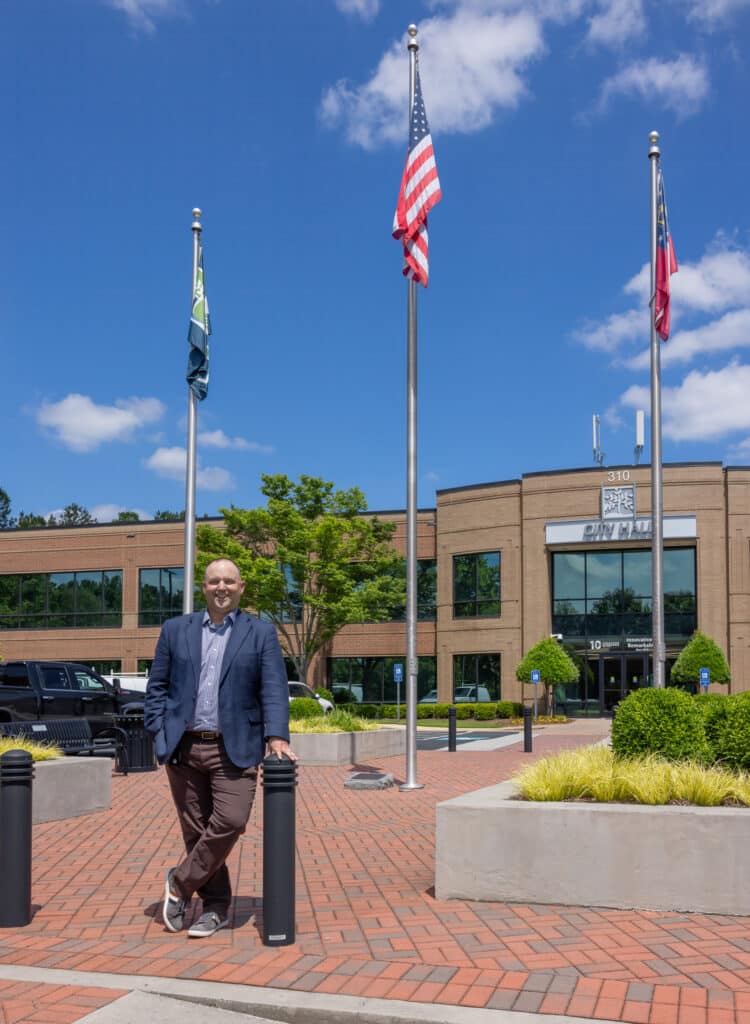
Local government possibilities
“After a handful of years, I got lured away into the private sector,” he said.
Working on land use and government relations matters from the other side of the table, Adams represented developers and investors.
“Sometimes [investors would] come to me with a property that they bought, and they’d say, ‘Hey, we bought this on investment. We’d like to see how we can make the highest and best use of it. Help us create a vision,’” he said. “So, I helped put a team together to determine what we thought could go on the site based off of local government zoning.”
His job entailed working with architects and engineers to design the site and help the client take it to market. Ultimately, the contract purchaser would come in and seek needed entitlements.
“I would help with that,” Adams said. “Those were the fun ones because you got to start on the ground.”
Adams got to know many different local government jurisdictions and worked extensively around metro Atlanta on various matters. On a busy week, he may work with five different jurisdictions across the state.
As a family man with a wife and two sons, he began looking for something that would keep him closer to home.
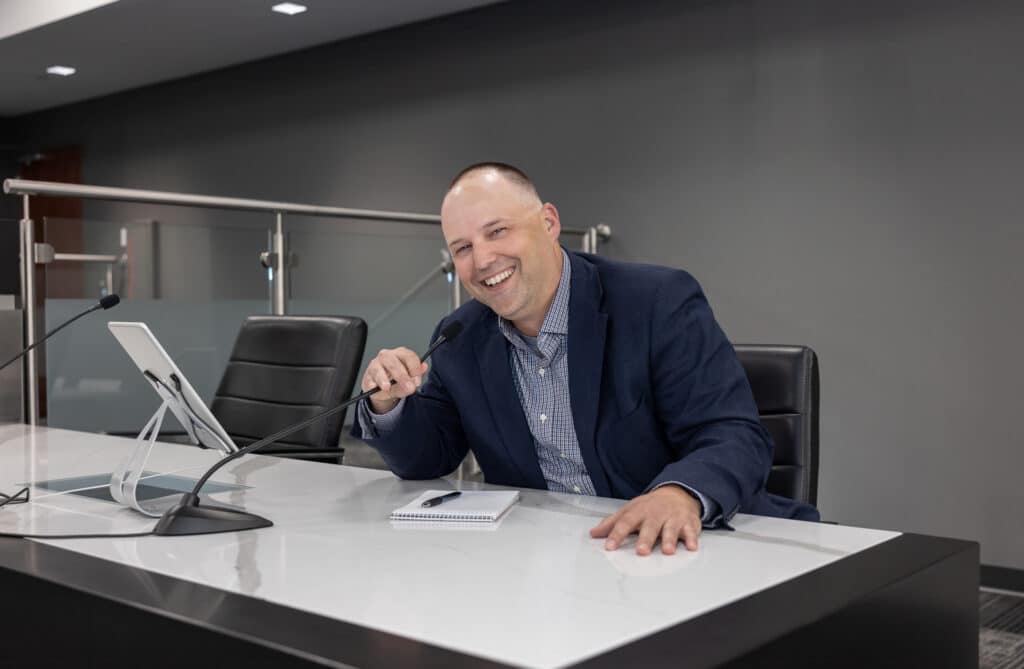
A perfect fit
City Manager Brian Johnson says it was serendipitous that Adams was looking for a position at a time when the city needed someone like him.
“It’s actually a hard position to fill, and I just happened to catch him,” said Johnson. “We were familiar with each other because he’s represented a number of clients coming before the city.”
Johnson said that Adams was legal counsel for some of the most significant developments in the last few years: North American Properties purchasing and revitalizing The Forum, housing development Waterside, and Intuitive Surgical moving its headquarters from the West Coast.
“He was on the other side of the table as we worked together to make these projects ultimately better for the city and better than they were upon their initial submittal,” Johnson said.
“And I knew then that he was a really knowledgeable guy that really knows how to deal with people. He’s a problem solver. He’s always looking for ways to figure out how to resolve conflict and navigate minefields as it relates to land use and all the laws and zoning that apply to it,” he added.
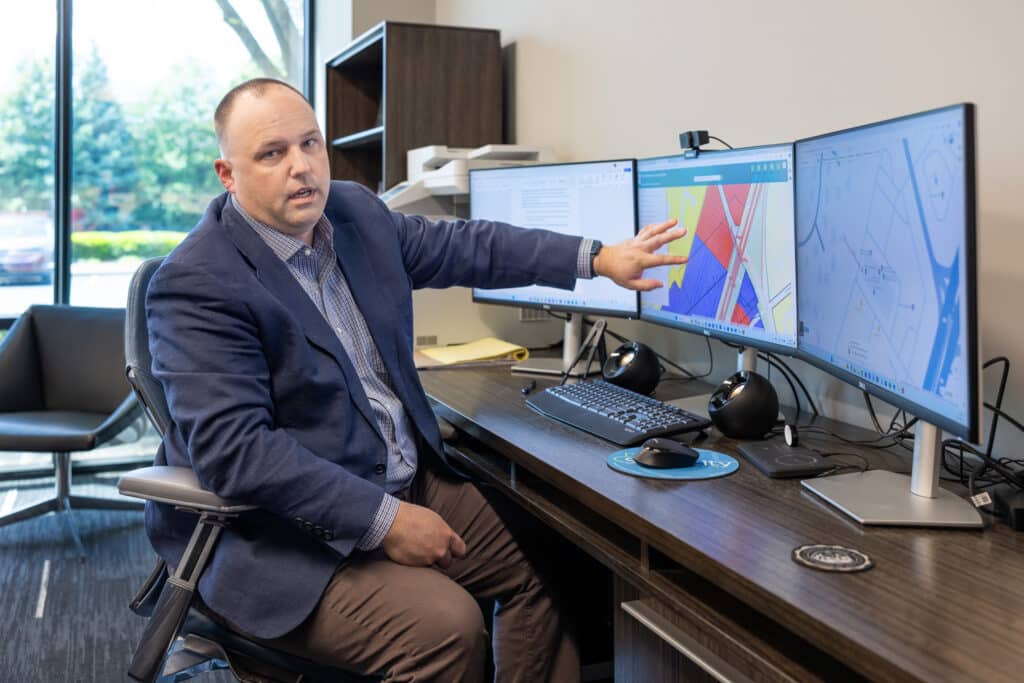
Changes to the job
Although Wheeler is no longer a staffer, she’s still doing work for the city.
With Adams’ legal background, the events planning team will be transitioning out from under community development.
“By taking that off my plate, it’ll allow me to do more with the legal side of things that the position didn’t do previously,” he said.
There will also be a shift with code enforcement duties moving under Chief Marshal Edward Restrepo.
“I moved code enforcement underneath the city marshal’s office because code enforcement and law enforcement are almost like fraternal twins — they both do very similar things,” said Johnson. “Each of them is enforcing a different level of law. Code enforcement is municipal code, and law enforcement is state code, but they work hand in hand.”
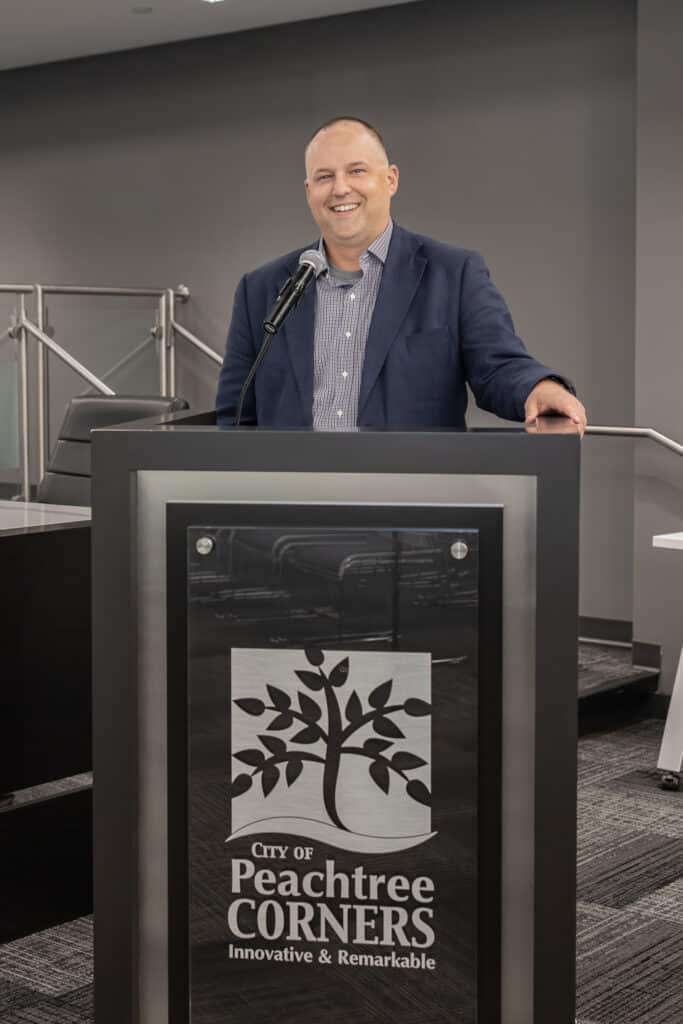
The events planning through the end of the year has already been moved from the community development director’s department. As a consultant, Wheeler will work with other contractors to manage the happenings at the Town Center. Director of Communications Louis Svehla has already moved into managing premier events, Johnson said adding that the city may use more consultants in the future under Svehla’s management.
“He has really shown his ability to manage special events very adeptly. He really showed me that skill set when we had last year’s Criterium bike race,” said Johnson. “I decided to take advantage of some opportunities, including our partnership with Audi, which we were going to announce to the whole vulnerable road user thing.”
With only three months to prepare, Svehla pulled off the event without a hitch.
“He did an outstanding job and so he is capable of taking the management of our community events, our concerts and stuff,” said Johnson.
Johnson said the city is still utilizing consultants for some aspects of special events, but if consultant fees become more expensive than hiring someone full-time to assist Svehla, he’ll make that call.
“All those moves have happened, and I’ll sum it up by just saying that I’m just playing to the strengths of these people and utilizing a great team that I have, and it’s working out really well,” Johnson said.
Related
Read the Digital Edition
Subscribe
Keep Up With Peachtree Corners News
Join our mailing list to receive the latest news and updates from our team.
You have Successfully Subscribed!

Taste of Peachtree Corners: PCBA Showcases Local Restaurants

What’s going on at Jones Bridge Park and the Challenges of Urban Development

The Forum Gives Sneak Peek of New Eateries and Community Spaces

Southwest Gwinnett Mayors Share Visions for the Future

Peachtree Corners Shines Bright with Light Up the Corners Glow Race this August

8 Events Happening In and Around Peachtree Corners This August

Peachtree Corners Shines Bright with Light Up the Corners Glow Race this August

The Forum Gives Sneak Peek of New Eateries and Community Spaces

8 Events Happening In and Around Peachtree Corners This August

Southwest Gwinnett Mayors Share Visions for the Future

Taste of Peachtree Corners: PCBA Showcases Local Restaurants

What’s going on at Jones Bridge Park and the Challenges of Urban Development

Local Resident Opens AtWork Location in Peachtree Corners

CHRIS 180 Expands its Services into Gwinnett County [Podcast]

Light up the Corners [Video]

Capitalist Sage: Business Leadership in Your Community [Podcast]

Cliff Bramble: A Culinary Adventure through Italy

Top 10 Brunch Places in Gwinnett County

A Hunger for Hospitality

THE CORNERS EPISODE 3 – BLAXICAN PART 1

Top 10 Indoor Things To Do This Winter

The ED Hour: What it takes to Remove Barriers from Education
Peachtree Corners Life
Topics and Categories
Trending
-
Business1 week ago
Taste of Peachtree Corners: PCBA Showcases Local Restaurants
-
Business2 days ago
The Forum Gives Sneak Peek of New Eateries and Community Spaces
-
City Government4 days ago
Southwest Gwinnett Mayors Share Visions for the Future
-
Community2 days ago
Peachtree Corners Shines Bright with Light Up the Corners Glow Race this August






